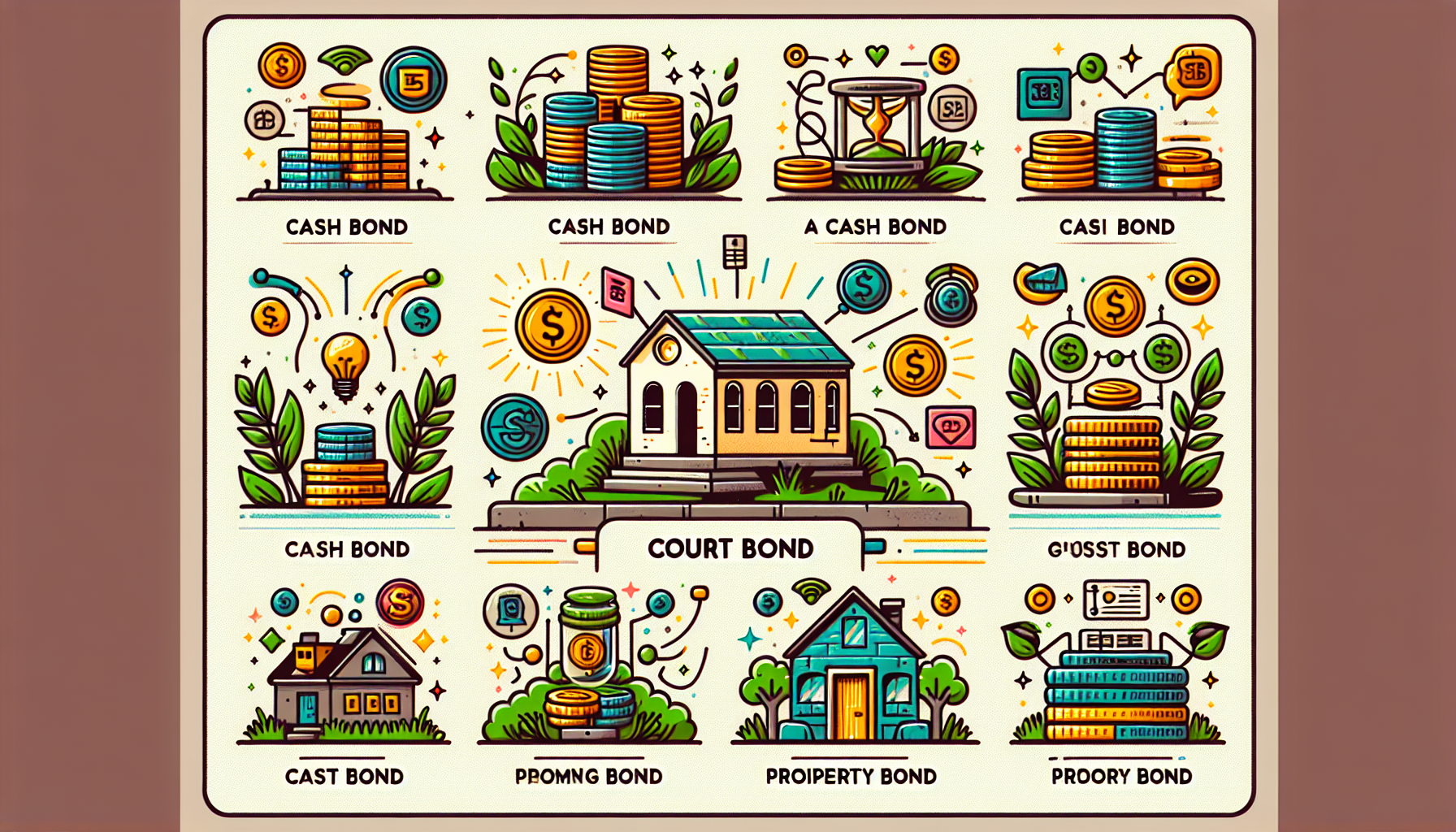What Is Bond in Court? A Simple Guide
A bond in court is a financial guarantee to ensure that a defendant will appear for their court dates. It serves as collateral to prevent the defendant from fleeing. This article explores different types of court bonds, including surety, cash, and property bonds, and their specific purposes, including what is bond in court. Additionally, we will discuss the bail bond process to provide a comprehensive understanding.
Key Takeaways
- Court bonds serve as financial guarantees ensuring defendants appear for their scheduled court dates, helping maintain their daily lives while awaiting trial within the bail bond system.
- There are four main types of court bonds: surety bonds, recognizance bonds, cash bonds, and property bonds, each with specific requirements and implications.
- Failing to appear in court can result in severe consequences, including bail forfeiture, additional penalties, and potential legal complications.
Understanding Court Bonds

A bail bond acts as a financial guarantee to the court, securing that a defendant will attend all required court appearances. The practice of using bail bonds dates back to ancient civilizations and has been documented historically in numerous societies. Comprehending how bail bonds work is essential for individuals charged with criminal offenses.
The bail bond business operates within a complex regulatory landscape, with various states either regulating or outlawing commercial bail bonding. This industry faces criticism for its impact on low-income communities and the justice system.
Surety bonds, recognizance bonds, cash bonds, and property bonds represent the four primary varieties of bail bonds available. Each variety ensures the defendant’s presence in court while affording them freedom to go about their normal life during the period before trial.
Subsequent sections will provide an in-depth look at what constitutes a court bond and its role within the bail bond process, laying down a comprehensive basis for grasping how the overall system of bail operates.
Definition of a Court Bond
A bond issued by the court serves as a financial assurance that obliges the defendant to attend all mandated court appearances. There are various types of bonds, each with distinct stipulations and consequences. For example, when granted a recognizance bond, the defendant is released without having to post any bail money—relying solely on their promise of making future appearances in court. This kind of bond is commonly assigned to individuals who are considered low-risk and whose word is deemed reliable.
In contrast, securing release through a cash bond necessitates paying the entire bail amount upfront via cash, check or credit card transaction. The complete sum will be returned provided that the defendant does not fail to appear for any scheduled courtroom sessions. This option can pose significant financial strain. Records indicate surety bonds were utilized even around 2750 BC, demonstrating their ancient roots within judicial practices.
When it comes to property bonds, they involve offering real estate assets as security against the bail obligations set forth by the court—which retains rights over these pledged properties until completion of all legal responsibilities by defendants. Should there be an instance where a defendant fails at attending required hearings in court, using such collateralized agreements could mean forfeiture of personal property—a risky yet feasible approach for those possessing considerable material worth. Understanding the bail bond process is crucial for navigating these various options effectively.
Purpose of a Court Bond
The main function of a bail bond is to guarantee the defendant’s attendance at trial. By providing financial assurance through the bail bond process, it reduces the likelihood that the individual will abscond prior to their scheduled court appearance. This arrangement also allows individuals to continue with work and family duties while they await legal proceedings.
Bail bonds aid in easing economic pressures. Rather than producing the entire amount of bail themselves, defendants have the option to employ a bail bond company’s services. A bail bond company facilitates bail services by entering into financial agreements with defendants, offering various types of bail, and outlining the responsibilities of both parties. This setup enables families to meet these expenses without undergoing undue financial hardship. Should the defendant adhere strictly to all judicial mandates, any posted bail money will be returned, thereby diminishing potential monetary losses.
Types of Court Bonds

Various forms of court bonds exist, all designed to guarantee that a defendant will attend their scheduled court appearances. These include surety bonds, cash bonds, and property bonds, each with its distinct stipulations and consequences in the bail bond process. It’s essential for individuals involved in the bail system to comprehend these various types. Bail bond companies play a crucial role in offering bail services by detailing the agreements involved, the fees charged, and the collateral required before issuing bail bonds.
Local bail bonds may be covered by insurance for traffic-related arrests, and the financial specifics tied to these bonds can vary by jurisdiction, including collateral requirements.
The conditions and repercussions associated with each bond variety are pivotal pieces of information that defendants must grasp when selecting an option. Grasping the nuances between these options is beneficial for making enlightened choices amidst the taxing times brought on by facing criminal charges.
Surety Bond
What is a bail bondsman? A bail bondsman is a professional who posts bail for defendants, charging a fee and often requiring collateral. A bail bond is a type of surety bond that involves a bail bondsman acting as the third-party guarantor to ensure the defendant will adhere to their legal obligations, including attending court dates. If a defendant fails to appear in court, the bondsman has the right to apprehend the defendant. This arrangement is often utilized when defendants are unable to pay the full amount required for bail set by the court. In such cases, a bond agent steps in and furnishes the necessary funds on behalf of the defendant while charging fees and securing collateral.
By enabling defendants to gain their freedom without having to pay out-of-pocket for the entire bail amount, these surety bonds play an essential role. The responsibility shifts onto the shoulders of a bonding agent who guarantees that those accused show up before a judge as needed.
The practice of offering surety bonds has long been fundamental within ancient and modern times alike throughout centuries in diverse judicial systems worldwide – establishing itself firmly within what’s known today broadly encompassing various aspects related directly tied back towards running successful operations centered around providing solutions specifically tailored toward individuals experiencing economic hardships whilst navigating through complex legal landscapes which require posting bails essentially ensuring smooth continuity ensuring all respective parties involved consistently maintain adherence concerning legally binding agreements stipulated clearly specified conditions regarding appearances must be met accordingly across courts thus maintaining integrity upon which foundations principles rely heavily entwined strategic constructs operate dynamically fashion woven intricately core philosophies govern how business conducts encapsulates essence functioning ecosystems thrive symbiotically interconnected network entities collaborate effectively achieving desired outcomes primarily focused facilitating processes wherein large sums money exchanged hands proxy actual services rendered direct compensation incentivizes provide alternative means obtaining release pending adjudication matters criminal nature revolving questions guilt innocence judiciary decrees invariably hinge participation key figures whose roles pivotal success hinges ultimately fate rests squarely theirs alone bear solemn duty fulfill commitments agreed contractually secured promissory notes commonly referred simply ‘bonds’.
Cash Bond
Paying the full bail amount in advance is a necessity with a cash bond. The bail bond process involves the defendant being reimbursed for this sum provided they show up for every court appearance. Without involving an intermediary bail bond agent, those who have sufficient funds might find this direct approach appealing due to its simplicity.
Nevertheless, coming up with the entire amount required for a cash bond can pose a substantial economic challenge. Should the defendant meet all of their legal obligations and attend necessary hearings, the money posted as bail is returned once judicial proceedings conclude. This method offers an uncomplicated route to post bail, but it may also impose hefty financial demands on individuals opting for it.
Property Bond
Pledging real estate as collateral constitutes a property bond, where the court retains control over the pledged property until all obligations to the court by the defendant are met. This is part of the bail bond process, which involves procedural steps to ensure the defendant’s compliance. Should the defendant fail to show up in court, this can result in forfeiture of that property by the court, which presents a substantial risk. For individuals possessing considerable assets, offering a property bond might serve as an appropriate substitute for posting cash.
Taking Nevada’s system as an illustration. Here a person may use their home as security under a property bond agreement. It provides defendants with an opportunity to gain pre-trial freedom without disbursing cash immediately while simultaneously bearing the grave consequence of potentially forfeiting their residence should they not make their scheduled appearances before the court.
The Role of Bail Bond Agents

Bail bond agents are a fundamental component of the bail system, providing an essential service by posting bail for defendants. This facilitates their freedom from custody as they await trial proceedings, a critical part of the bail bond process. When individuals find themselves unable to post bail either for themselves or someone close to them, reaching out to a bail bond agent frequently becomes the preferred alternative. Bail bond agencies provide financial guarantees to ensure that defendants appear in court after being released on bail.
These agents assess potential clients’ financial trustworthiness before offering their services. While not employed by the court itself, these professionals engage with defendants or guarantors directly in order to fulfill the requirements necessary for posting bail. The role of a bond agent is particularly prevalent within the United States where both commercial bonding companies and individual agents make up an integral part of this aspect of jurisprudence known as commercial bail bonding.
Responsibilities of Bail Bond Agents
Bail bond agents play a crucial role in the judicial process by facilitating the release of defendants from custody through posting bail. As part of the bail bond process, they charge a fee and may require collateral to secure the defendant’s temporary freedom. Should the defendant fail to fulfill their obligation to appear before court, whoever provided bail will be held accountable for paying back the entire amount of bail.
These bond agents are responsible for making sure that individuals who have been charged show up at all required court dates. To aid in compliance with this requirement when they’ve posted bail on someone’s behalf, conditions such as mandatory check-ins or setting curfews can be enforced by them. If necessary, these same agents are empowered to act like bounty hunters tracking down those accused persons who dodge their court appearances after receiving bail support.
Licensed Bail Bond Agents
It’s imperative for bail bond agents to adhere to particular licensing criteria as prescribed by state regulations. Understanding the bail bond process is crucial, as adherence to such rules guarantees their operations are conducted within the bounds of legality and uphold professional norms. Opting for a licensed bond agent is essential to secure dependable and legal service.
As a credible ally, AffordaBailTM offers rapid and economical bail bonds across Tennessee. Boasting an adept team of seasoned bond agents, they render crucial aid by steering clients through the intricacies of the bail process, facilitating their journey through the justice system.
Setting Bail Amounts

At a bail hearing, which typically occurs during the defendant’s initial court appearance following their arrest, the judge sets the amount of bail. This decision is at the judge’s discretion and is influenced by multiple considerations including both how serious the crime in question is and whether or not there’s an existing criminal record for the defendant, as part of the bail bond process.
For those navigating through aspects of posting bail, it’s important to grasp why certain bail amounts are assigned. A range of elements come into play when determining these costs. Gaining insight into these factors as well as familiarizing oneself with standard bail schedules offers a thorough understanding of this integral part of our judicial system known as the bail process.
Factors Influencing Bail Amounts
A judge determines the bail amount by considering multiple elements. The bail bond process involves evaluating factors such as the severity of the criminal charges and the perceived risk to public safety, which can lead to higher bail amounts. The defendant’s past conduct regarding their criminal record and history of appearing in court can also result in elevated bail levels.
On the other hand, factors such as solid family connections and consistent employment might lead to the reduction of a bail amount. In deciding on bail, judges will assess how likely it is that the defendant could become a flight risk, contemplating if they might attempt to escape before their scheduled court date.
Bail Schedules
In some areas, standard bail amounts for different offenses are established through the use of bail schedules. These schedules serve as a reference to maintain uniformity and equity in determining bail during the bail bond process.
By familiarizing themselves with these bail schedules, defendants and their loved ones can gain insights into what the expected bail could be, allowing them to plan ahead for potential financial requirements.
Bail Bond Premium and Collateral
When navigating the bail bond process, understanding the financial commitments involved is crucial. Two key components to be aware of are the bail bond premium and collateral requirements. These elements play a significant role in securing a defendant’s release from jail and ensuring their compliance with court appearances.
Understanding Premiums
A bail bond premium is the fee charged by a bail bond agent for their services. This fee typically ranges from 10% to 15% of the total bail amount and is non-refundable. The premium is usually paid by the indemnitor, who is often a friend or family member of the defendant. For example, if the bail amount is set at $10,000, the premium could be between $1,000 and $1,500.
In addition to the premium, bail agents may require collateral to secure the bail bond. Collateral can include cash, property, or other valuable items and serves as a safeguard for the bail bond agency. The collateral is returned once the defendant fulfills all court obligations, but if the defendant fails to appear, the collateral may be forfeited to cover the bail amount.
It’s important to note that the premium is separate from any collateral required. Bail agents are not allowed to charge additional fees beyond the premium, except for out-of-pocket costs. To determine the maximum premium amount, you can use a bail premium calculator, which helps in understanding the financial implications of securing a bail bond.
By comprehending these financial aspects, individuals can better navigate the bail bond process, ensuring they meet all requirements and avoid any additional legal or financial complications.
What Happens After Posting Bail?
By posting bail, a defendant secures their release from jail pending trial, thereby gaining the opportunity to prepare themselves for their upcoming court case outside of incarceration. Adherence to specific obligations and conditions is requisite upon obtaining this provisional liberty.
After posting bail, it is crucial for one to comprehend both the mechanics of the bail bond process as well as any stipulated requirements or constraints that may be attached, offering insight into what can be anticipated throughout this interim phase.
Release from Jail
After the defendant has posted bail, they are usually freed from jail within a period ranging from 30 minutes to several hours. This duration may differ due to the specific protocols of the jail or depending on when during the day bail is submitted. Even with court authorization, a bail bondsman must agree before an individual can travel out-of-state following posting bail.
The bail bond process plays a vital role in facilitating defendants’ preparation for their upcoming court case while enabling them to continue with their everyday duties. Understanding this process’s subtleties could prove advantageous and might help alleviate some of the distress associated with being detained.
Conditions of Bail
Adhering to the stipulated conditions is a critical aspect of posting bail. Understanding the bail bond process is essential, especially when released on personal recognizance, as the defendant is exempt from paying bail money, thereby allowing release without financial commitments. Should there be any breach in these conditions, it could lead to re-arrest.
In certain situations where bonds are deemed non-refundable, this factor plays into how one handles their bond management. Using a credit card for payment of bail might have an adverse impact on the credit score if associated fees are not settled promptly. Grasping these stipulations is essential for compliance and preventing additional legal issues.
Consequences of Failing to Appear in Court

Not appearing in court when required can lead to significant repercussions. The bail bond process involves bonds issued by the court to offset any financial risks incurred if a defendant does not show up for their scheduled appearance. Should a defendant neglect to attend their court date, they become liable to pay the entire amount of bail, and it falls upon the bail bondsman to cover this payment on behalf of the individual.
When one fails to present themselves before the court as expected, it may result in both forfeiture of the bail paid and imposition of extra penalties. Such measures underline how critical it is for individuals under judicial scrutiny to comply with orders from the court, emphasizing respect for legal processes.
Forfeiture of Bail
In the event that a defendant fails to appear for scheduled court appearances, the bail bond is seized by the courts. Consequently, this forfeiture results in a permanent loss of the bail funds and obligates the bail bondsman to remit the entire amount of bail to the court. Any collateral—like property or financial securities—that was pledged will be subject to confiscation by the bail bond agency.
The responsibility falls on a bail agent when they pay out their own resources covering full payment of an individual’s set bond. Should such an individual abscond from legal proceedings (also known as ‘skipping’ or ‘jumping’ bail), then whatever assets were offered as security are appropriated by said agency. This scenario underlines why it is critical for individuals released on bail not only understand but adhere strictly following all prescribed dates with their respective legal processes thus avoiding substantial fiscal detriment alongside judicial repercussions.
Additional Penalties
Neglecting to show up for a court date can result in grave repercussions, such as the imposition of extra charges. A court might not only confiscate your bail, but also apply sanctions like levying fines or issuing arrest warrants as part of the bail bond process. It is imperative that defendants be present at their scheduled hearings to avoid these harsh consequences.
Overlooking an appearance in court does more than just inflict monetary damages. It compounds the defendant’s legal difficulties as well. Recognizing these potential additional penalties highlights the necessity of complying with judicial directives and being present for all mandated court appearances.
Summary
Understanding the bail bond system is complex, yet grasping its fundamental components such as court bonds, the pivotal role of bail bond agents, and the bail bond process can shed light on this intricate process. Court bonds—whether in cash, surety or property form—are designed to guarantee a defendant’s appearance in court while permitting them to continue their everyday activities. Bail bond agents are integral to the system. They provide assistance by posting bail for those who lack the financial resources to do so themselves.
When setting bail amounts, several factors come into play including the nature of the alleged offense and any past history with law enforcement that an individual might have. Once defendants post bail through these agents or other means, it is incumbent upon them to follow specific terms set forth and recognize how grave failing to appear in court would be. Bearing these considerations in mind enables individuals involved with posting bonds to operate more smoothly within legal boundaries while avoiding significant judicial consequences and potential additional costs.
Frequently Asked Questions
What is a court bond?
A court bond serves as a financial guarantee, ensuring that a defendant appears in court and can take the form of a surety bond, cash bond, or property bond.
It plays a crucial role in the judicial process.
How does a surety bond work?
A surety bond works by involving a third-party agent who guarantees the defendant’s appearance in court, allowing them to secure their release without paying the full bail amount upfront.
This arrangement ensures that if the defendant fails to appear, the surety company will cover the bail cost.
What happens if a defendant fails to appear in court?
If a defendant fails to appear in court, the bail is forfeited and the bail bondsman is responsible for paying the full amount.
Additionally, this may lead to fines or the issuance of arrest warrants.
What are the conditions of bail?
Conditions of bail typically include requirements such as regular check-ins, curfews, and travel restrictions. Non-compliance with these conditions can lead to re-arrest.
How are bail amounts set?
Bail amounts are determined at a bail hearing, taking into account the crime’s severity, the defendant’s criminal history, and their community ties.
This ensures that the bail is appropriate to the circumstances of the case.





